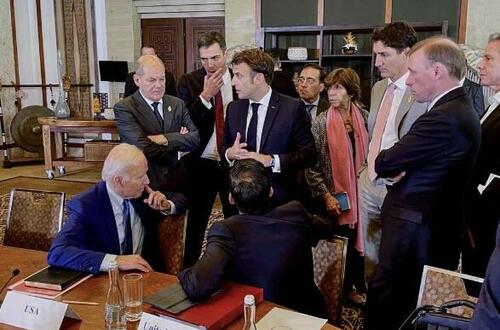Whatever you may think of Vladimir Putin and Xi Jinping, they do look and behave like world leaders. Not so for the empty suits reading their teleprompter lines in Western countries. Go figure why the rest of the world is not impressed.
Authored by J.B.Shurk via The Gatestone Institute,
If you are a consumer today, inflation is only one of the problems harming you.
As prices go up, quality continues to go down.
What most stores have to offer you might crassly be called "cheap crap." In fact, economic writer Charles Hugh Smith has repeatedly warned that the "crapification" of the U.S. economy is the natural result of a "neoliberal-hyper-financialization-hyper-globalization model," in which quasi-monopolist manufacturers mass-produce goods with the cheapest possible components, while customers with scant other buying options are forced to accept that few purchases will last.
"Planned obsolescence," combined with a free market "in name only," creates a rigged system in which downstream consumers are forced to pay more over time, while owning little that will maintain value for long. Appliances that used to work for decades now barely make it through legally required warranty periods. Metal tools that could be passed from one generation to the next now tend to rust before they can be used on more than a handful of jobs. When expensive electronic devices survive more than two years, cash-strapped households breathe a sigh of relief. Just about anybody who is old enough to remember the 9/11 terrorist attacks can tell a story about some product that was so much cheaper, yet so much more reliable, when it was purchased long ago.
Likewise,
customer service is more pitiful than it has ever been. Try to speak
with a real human on the phone. It is nearly impossible. Automated
assistance has eliminated personal interaction from most buying
experiences. Gas stations, fast-food restaurants, and convenience stores
have replaced human cashiers with camera-equipped machines designed for
self-service. Even a visit to a grocery or home goods store now
routinely requires the use of a self-checkout kiosk when making a
purchases. It has become entirely normal to witness people
struggling through the routine of lifting everything out of their
shopping carts, scanning each item, and placing the load into bags,
before throwing everything back onto carts, paying, and shuffling away.
It is somewhat perplexing to consider that not so long ago, helpful,
smiling employees worked hard to take care of all those services as part
of the ordinary relationship maintained between a business and its
customers.
Cutting out the cost of extra employees whose hourly wages have been pushed higher and higher by minimum wage laws that try to keep workers aligned with the rising cost of everything might help prevent already inflated prices from rising even further, but it is difficult to watch shoppers performing jobs once done by paid workers without concluding that "progress" has taken the market experience to a place that feels closer to "regress."
Politicians seem to be heading in a similar direction.
Pictured: National leaders, including US President Joe Biden, German Chancellor Olaf Scholz, French President Emmanuel Macron, British Prime Minister Rishi Sunak, Spanish PM Pedro Sanchez and Canadian PM Justin Trudeau strike a deep, contemplative pose at the G20 summit on November 16, 2022 in Nusa Dua, Indonesia. (Photo by Hebestreit/Bundesregierung via Getty Images)
Politics, as a profession, has always been known to attract at least as many ambitious "empty suits" as it does leaders of substance.
Still, the great writers, orators, and thinkers that occasionally rose to political prominence in the past seem to have left the stage for good.
Winston Churchill not only led the United Kingdom to victory during WWII but also won the 1953 Nobel Prize in Literature "for his mastery of historical and biographical description as well as for brilliant oratory in defending exalted human values."
Daniel Patrick Moynihan not only represented New York as a U.S. Senator but also drew on his own sociological expertise while serving in the Labor Department to produce a thorough report on the endemic causes of, and potential remedies for, systemic poverty in America.
President Abraham Lincoln not only was instrumental in preserving the Union but also a dedicated student all his life; he kept the works of William Shakespeare on his White House desk.
In contrast, few deep thinkers rise to high office today.
There are no great statesmen whom the broader public see as towering above the herd of self-centered and cynical political lemmings. Few professional politicians, especially those in the United States, are even capable of speaking extemporaneously before an audience for any stretch of time. Too many rely on the assistance of teleprompters or similar devices to provide an exact script for every publicly spoken utterance, no matter how trivial or informal — suggesting that either they or their staffs cannot trust just what might otherwise escape their lips.
Rather than pursuing political office after having accomplished great things in other fields, the vast majority of today's officeholders choose politics as a vocation for life. The end result is that Western governments are filled to the brim with people entirely lacking in real-world experience or specialized knowledge.
In recent decades, a noticeable trend in the West has been to elevate politicians, as young and inexperienced as possible, into offices as high as possible.
Many of the most famous politicians today no sooner secure a single election victory than their colleagues began pushing them into government roles at the top of the political hierarchy. Former U.S. President Barack Obama, Canadian Prime Minister Justin Trudeau, French President Emmanuel Macron, U.K. Prime Minister Rishi Sunak, Finnish Prime Minister Sanna Marin, former New Zealand Prime Minister Jacinda Ardern, and her successor Chris Hipkins all ascended to the zeniths of national power exceptionally early in their careers.
Looking around at the legislators, presidents, and prime ministers today who are leading Western nations on the world stage, you could be forgiven for extrapolating that the quickest path to political power is to accomplish little in the real world, while scrambling up the political pyramid before there is time to make or learn from mistakes. Such a system -- in which those who have proven themselves the least are given responsibilities that would test even those who have proven themselves time and again -- hardly looks ideal.
On the flip side is someone such as U.S. President Joe Biden, the oldest to have ever held the office. Whereas Biden's near half-century in national elected office has surely afforded him the chance to make and remedy many mistakes, he is now so "seasoned" that few weeks go by when some publication does not question either his mental competency, ability to keep up with the rigors of such a demanding job, or the wear and tear on the "influence" possibly peddled.
Two stories, embodying the "crapification" of products, recently emerged, concerning the authenticity of a presidential speech. In the first, a fake video created through the use of artificial intelligence showed Biden announcing the implementation of the Selective Service Act and the imminent drafting of young Americans born on a certain date into military service. Amid heightening tensions with Russia and China, many Americans who came across the video mistakenly assumed that the United States had officially gone to war.
In the other video, Biden's quite real but somewhat confusing and meandering storytelling during a speech about health care was mistakenly labeled as "doctored" or "fake" by enough viewers that Twitter actually added a certification label attesting, "This is in fact unedited legitimate footage from a Joe Biden speech which took place on 2/28/23." Clearly, in a world where fake videos have become remarkably easy to construct, everyone's credibility and reputation are now at risk.
Chintzy products and tinpot politicians are nothing new. Whether spending money or casting votes, the same caveat emptor principle applies: Let the buyer beware. Still, it is worth considering whether the political and economic knockoffs flooding Western markets today have something in common.
A Nigerian proverb warns against small singing birds with loud voices, because they almost always have much stronger protectors hidden behind thicker leaves. What today's Western political leaders might lack in lengthy experience or trustworthy rhetoric, they certainly make up with bombastic pronouncement.
Ever since the dawn of COVID, "Build Back Better" has been repeated by "young global leaders" flocking to Klaus Schwab's World Economic Forum in Davos, Switzerland. When Schwab and his WEF companions turned COVID tragedy into an opportunity for unleashing a "Great Reset" that would transform global markets, governance and power, nearly every Western political leader agreed. The synchronicity is enough to make you wonder whether it is your nation or the World Economic Forum that actually leads. Perhaps as the Nigerian proverb warns, today's Western political leaders chirp about "Build Back Better" so loudly because Klaus Schwab's financial predators stand directly behind them in the bush.
If so, then the West has become an oligarchy of financial "elites," no matter how many times its political leaders extol the virtues of "democracy."
A financial oligarchy over political power is like a manufacturing monopoly over economic power: In both markets, goods are mass-produced with the cheapest possible components. The end result is that things break easily, and systems do not last. If Western politicians seem just as second-rate these days as what customers all too often find in stores, there may be a simple reason why: International financial titans make, sell, and own both... and may be planning to own you, too.



No comments:
Post a Comment